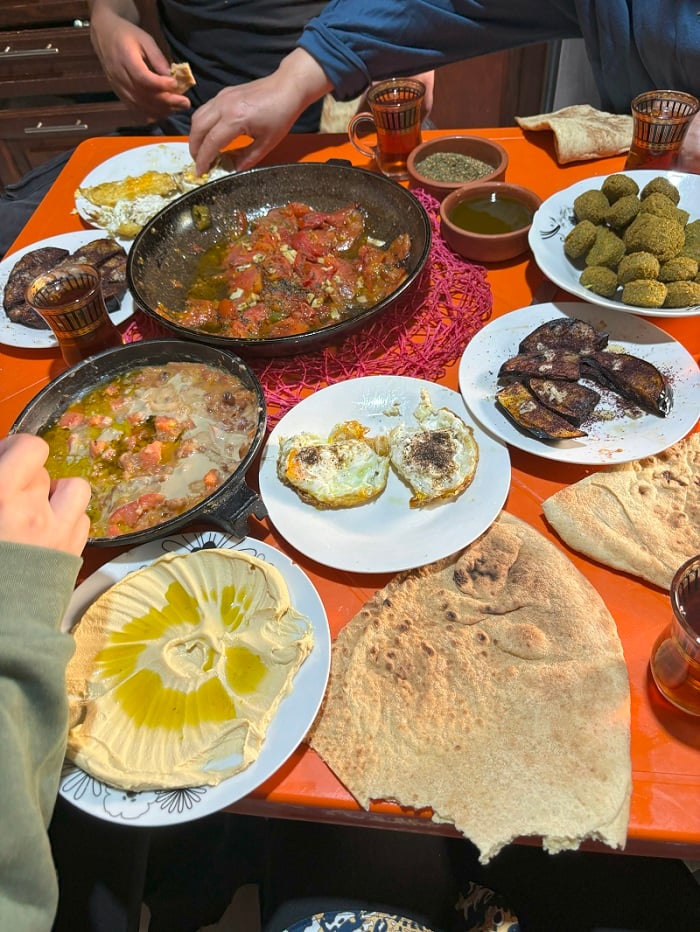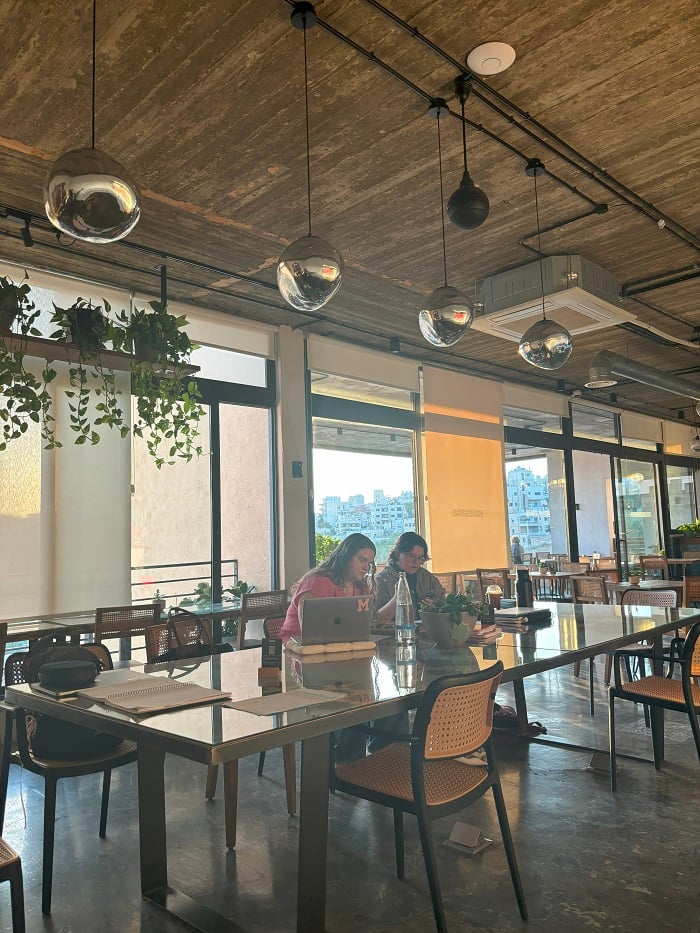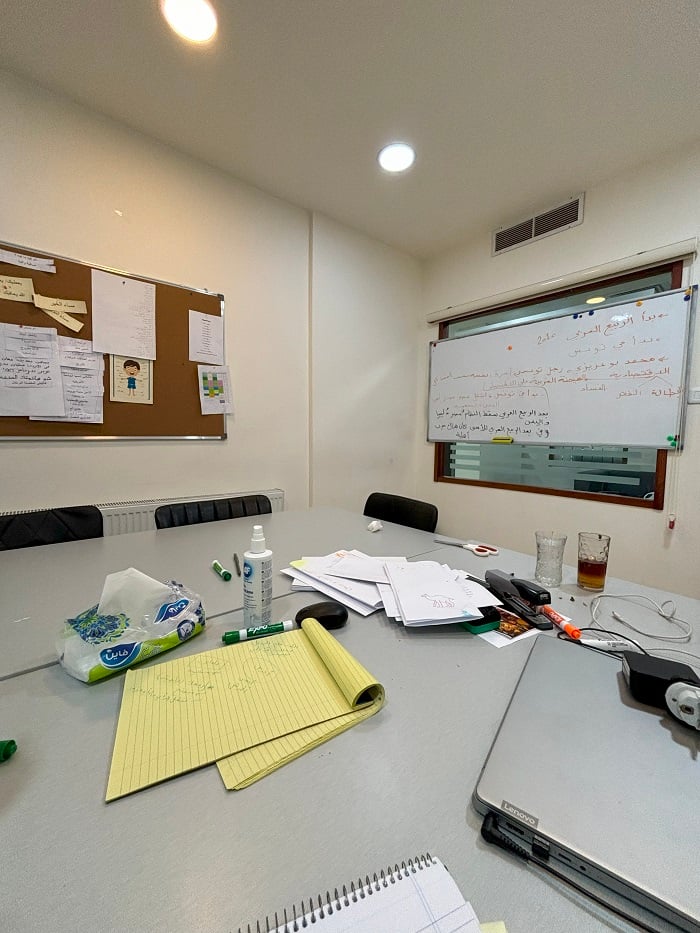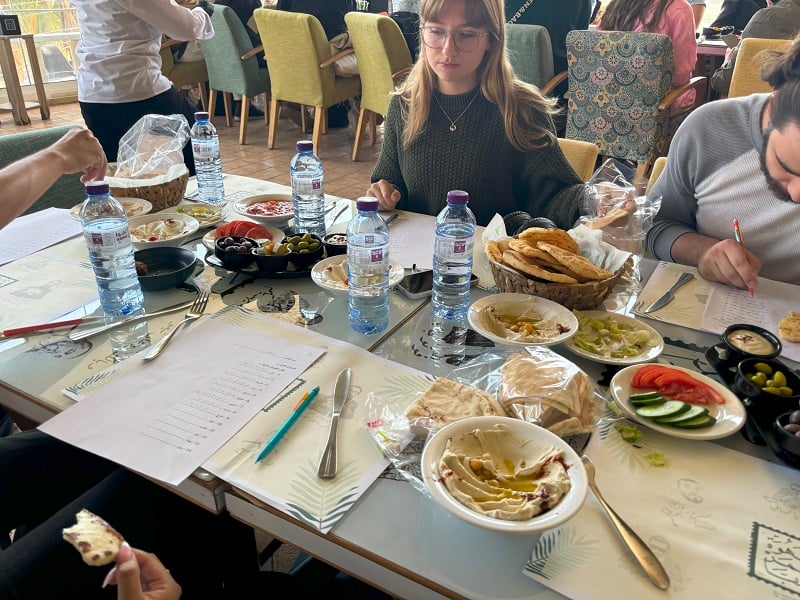Written by Harper Schrader, (Kalamazoo College), Student Correspondent for CET Jordan, Fall 2024
Why did you choose to study abroad in Amman, Jordan or with CET specifically?
I chose to study in Jordan because my college doesn’t offer Arabic. I knew that this experience was my best chance to learn the language deeply—especially since I plan to use Arabic in my future work. The full language pledge here was also a huge draw; it guaranteed that I’d be immersed in Arabic daily. While many students in this program have previous experience with the language (which I’d definitely recommend), I came in with zero background, along with about five other students. The first week was tough! It’s natural to want to stick with friends at your language level, but I’d encourage making friends with students in higher levels too. The more Arabic you hear around you, the faster you’ll pick it up. The teachers also help by repeating key phrases daily, so you learn words and responses almost automatically.
Beyond language, I chose Jordan because I want to challenge stereotypes about the Middle East when I return to the U.S. There’s a prevalent misconception that the region is defined by war and terrorism. In reality, it’s one of the most beautiful places on earth, home to the kindest people I’ve ever met. By studying here, I hope to inspire more students to consider the Middle East as a study abroad destination instead of defaulting to Europe. This region offers so much to learn and experience, and I’m grateful to be part of it.
How do you budget your money while abroad? What did you typically spend in a week?
One unexpected cost was commuting to and from cafes. Our apartments have limited Wi-Fi, so cafes are often the best place to do homework. Plus, unlike typical American apartments, our spaces here mostly have coffee tables and couches rather than study desks. Cafes in Jordan aren’t like back home, where you might feel obligated to buy a drink every hour. Here, people go to cafes to socialize, and you can easily stay for hours. Coffee prices typically range from 2-4 JD, and many cafes also offer food, which is great for late-night study sessions. But be sure to budget for Uber rides, since Amman isn’t very walkable. This small, regular expense can add up over time. You may also need to purchase essentials like laundry detergent or extra silverware for your apartment.
How did you break out of the American student “bubble” and make friends in your new city?
Cafes in Amman often host events, especially art-related ones, which are a fantastic way to meet people. My best advice? Just say yes! If classmates invite you to meet their local friends or family, go with them. If your language partner offers, accept! It’s a great way to meet people, learn more about Jordanian culture, and pick up new dialects and phrases.
What does public transportation look like? Is it easy to get around?
For getting around, I recommend the “Careem” or “Jenny” apps, which are cheaper than Uber. For food or grocery deliveries, “Talabat” or “Careem” also work well.
What are the dos and don’ts of packing?
Don’t overpack clothes. Clothing here is inexpensive and good quality. Buying locally makes it easier to find modest options, which are generally the norm. Also, don’t underestimate how cold it can get! Despite being from the Midwest, I was surprised at how chilly 50 degrees felt once my body adjusted to Jordan’s climate. Bring a warm jacket for cooler nights and cloudy days!
What do you and your language partner have in common? What unique insights have they shared?
When all the students first met their language partner, CET arranged a lovely breakfast where we got to chat and play games. It felt like having another family in Jordan—which will give your parents peace of mind! You can talk to them like a brother or sister for advice on homework, life in Amman, and everything in between. This connection lets you learn conversational Arabic and everyday phrases that might not be covered in class. Plus, when they invite you to meet their friends or family, you get more chances to engage with Jordanian culture.
What’s it like to have Jordanian neighbors (jiran)?
On the first night in Amman, CET students meet their Jordanian neighbors at dinner. They invite us to events around the city, which is a great way to explore beyond Sweffiyeh. Early on, they took us to the Amman Citadel and a local restaurant downtown, which can feel overwhelming to do on your own for the first time. They also set up a group chat to share activities like girls’ nights, board games, and cooking nights, and they’re always available to help with homework or advice. The neighbors come from various parts of Jordan, so you get used to different dialects and can even get travel tips, plus you will be held to the language pledge!


Are there any surprising cultural norms or unwritten rules?
One of the most important customs to remember is not to have the sole of your shoes facing someone while sitting. That’s considered highly disrespectful. Additionally, in taxis, boys typically sit in the front seat while girls sit in the back, though this can vary in all-girl groups. You’ll also notice that smoking is very common here, even in elevators! Initially, it might surprise you, but you quickly get used to it, especially since shisha is prevalent in most cafes and restaurants. Finally, be sure to ask for the check if you are at a restaurant because they won’t bring it to you like in the U.S., because people use restaurants and café places as social spaces, where there is no rush to leave.
What is the class structure and what are the academic expectations?
The first few weeks focus intensively on Arabic. You’ll take two hours of Modern Standard Arabic (MSA) and two hours of Jordanian dialect daily, along with office hours a few times per week with your professor. You’ll typically have the same professor for both classes unless your placement differs for MSA and dialect. Each class is 50 minutes long, followed by a 10-minute break, a structure recommended by our academic director and supported by research.
About two or three weeks into the program, English-language content courses are introduced, which are integrated into your schedule as the Arabic class hours are adjusted. Finally, the program adds Arabic-language content courses, which cover advanced topics exclusively in Arabic. At this stage, you’ll have one hour each of MSA and dialect daily, along with Arabic content courses aligned to your language level. Courses are offered at various times to accommodate different language levels among students.

Attendance is required every day, and punctuality is highly emphasized. I recommend taking the Arabic-only content courses. Even as someone who started with no Arabic background, I found these courses invaluable. They not only push you to advance quickly, but also let you discuss complex topics like the Arab Spring in Arabic. While it can be intimidating, the professors are incredibly supportive. If you’re struggling, they are always there to help, so take full advantage of their guidance.
Additionally, this program is not in conjunction with the University of Jordan. This may be obvious, but I know many students come here with the expectation that CET and the University or Jordan are partnered, which isn’t the case. However, this is no problem because it offers you more individualized attention and an all-Arabic environment!
What is safety like in Jordan?
A top concern—especially for family members back home—is usually: “Is it safe to study in Jordan right now?” The short answer is yes. Jordan is one of the safest countries in the region, and you’ll likely feel very safe once you’re here. Jordan has a strong relationship with the United States, and King Abdullah II is highly committed to keeping the country secure. It can be hard to understand until you are actually living in Jordan.
Additionally, CET takes pride in student safety and would never place students in harm’s way. For instance, when a recent missile incident occurred in October, CET acted quickly to keep us informed and updated on safety measures.
The neighborhood where CET students stay is close to the U.S. Embassy, adding a level of security. You’ll also notice that local Jordanians tend to have a sense of resilience when discussing nearby conflicts, which reflects their familiarity with the region’s dynamics.
While physical safety is a priority and is well-supported, I recommend preparing for the mental and emotional challenges of being near regions experiencing genocide, like Gaza and Lebanon. Being this close can sometimes be emotionally taxing. I recommend making an appointment with the therapist here after orientation, so you have a relationship built before you encounter any problems. You’re living in a whole new country— of course you will feel overwhelmed! So don’t hesitate to reach out for help.
What does an average day look like?
My day at the CET center typically begins at 9 a.m. with either a content class or office hours. After that, I attend an additional hour of extra support that I requested with my professor. Next, I have one hour of dialect class followed by an hour of Modern Standard Arabic (MSA) class. If I don’t have another content class, I’m done for the day.

After classes, I usually head to a café to do homework while grabbing dinner. I aim to finish my assignments early so I can explore different parts of Amman. There’s no need to worry about the time since everything stays open late. Then, it’s time to rest and do it all over again!
A Final Piece of Advice
As you embark on your journey, here is one piece of advice I want to leave you with. No matter where you study abroad, before you leave, write a letter to yourself about why this experience is important you—why you chose this country instead of anywhere else in the world. Anytime throughout the duration of your program that you feel overwhelmed, look at that letter to remind yourself why you want to work hard and acquire the skill of a new language, and the love for another country.
Source link
All Materials on this website/blog are only for Learning & Educational purposes. It is strictly recommended to buy the products from the original owner/publisher of these products. Our intention is not to infringe any copyright policy. If you are the copyright holder of any of the content uploaded on this site and don’t want it to be here. Instead of taking any other action, please contact us. Your complaint would be honored, and the highlighted content will be removed instantly.
